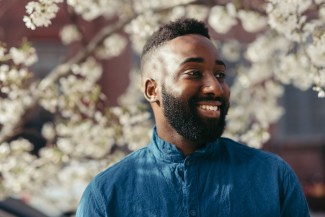 It’s a funny thing, Zooming with Spike Lee. He’s remote, confined within a box within a box on your computer screen, and yet somehow undiminished.
It’s a funny thing, Zooming with Spike Lee. He’s remote, confined within a box within a box on your computer screen, and yet somehow undiminished.
Maybe it’s the look — the ball cap and the glasses — or maybe it’s the way he looks at you. Lee has been staring directly into cameras for more than 30 years. Think of his most famous characters — Mars Blackmon, from his 1986 feature “She’s Gotta Have It,” and a series of Nike commercials with Michael Jordan; or Mookie from “Do the Right Thing” — and they’re confronting you head-on. This is Lee’s preferred stance: undaunted, in your face, eye-to-eye. And it works. Even on a stuttering videoconference, the man is unmistakable.
He’s been isolating at his home on the Upper East Side since March, when the coronavirus pandemic shut down much of New York City. His only regular contact with the outside world comes via his bike — a gift, custom-painted orange and blue in honor of his beloved New York Knicks — which he rides alone for three to five miles each morning, wearing a mask and helmet. At night, he has family dinners with his wife, Tonya, and two children, Satchel and Jackson, just as the neighbors begin cheering and banging pots and pans as part of citywide tributes to beleaguered health care workers.
As a 63-year-old African-American, Lee is in a high-risk group for mortality from the virus. Is he afraid? “Hell yeah, I’m afraid!” he said, sitting on a sofa beneath an oversized, vintage poster for the 1950 biopic “The Jackie Robinson Story.” “That’s why I’m keeping my black ass in the house!”
This is Lee at a strange and singular moment in his career. He has spent nearly four decades and more than 30 films reckoning with the jagged and brutal course of history. Now, in the middle of a global calamity, and with a new film, “Da 5 Bloods,” that revisits the Vietnam War, he is its witness once again — older, more contemplative and as insatiable as ever, despite a legacy as solid as exists in American cinema.
Read more

 It’s a funny thing, Zooming with
It’s a funny thing, Zooming with 
 More than three months have passed since the
More than three months have passed since the
You must be logged in to post a comment.